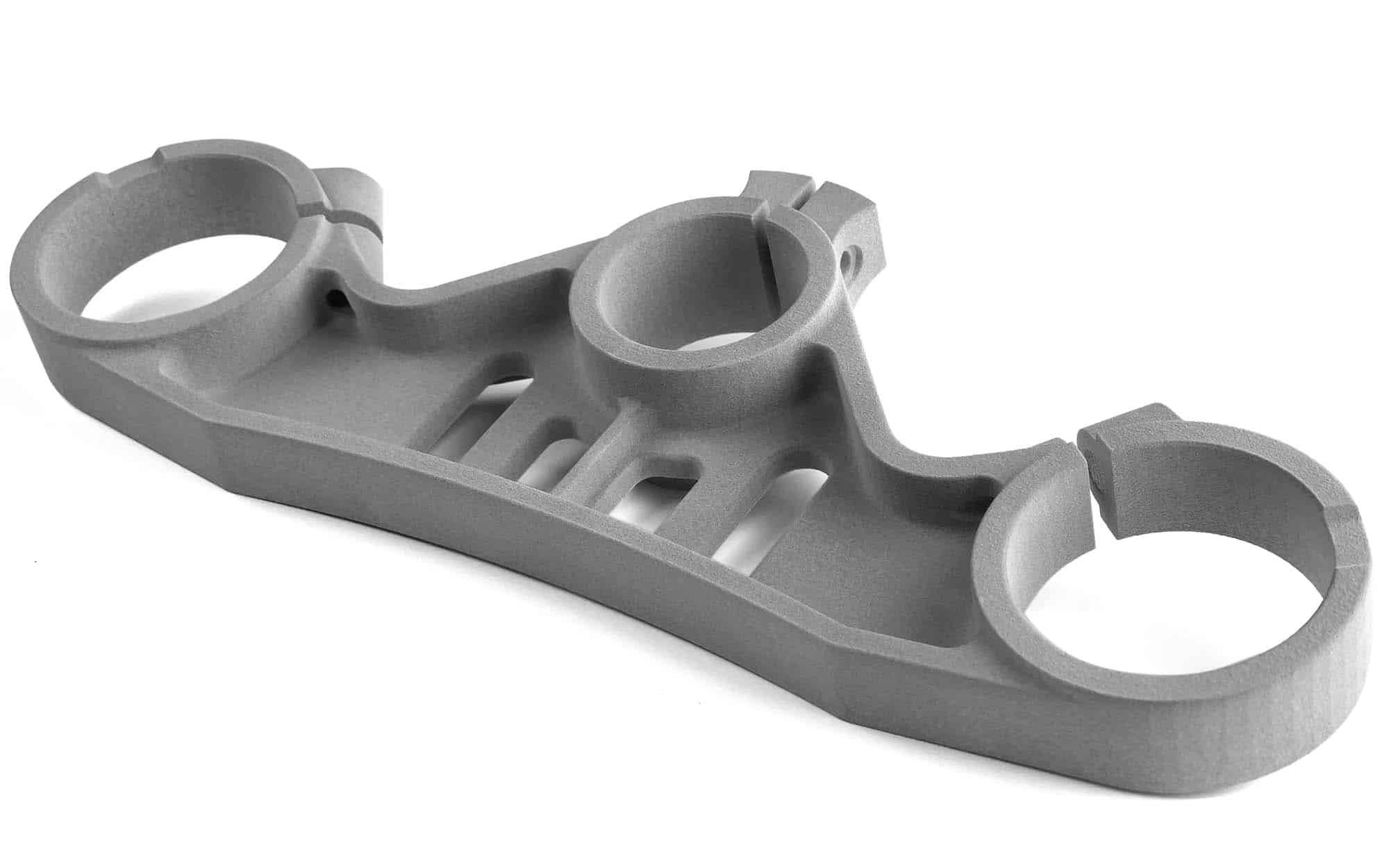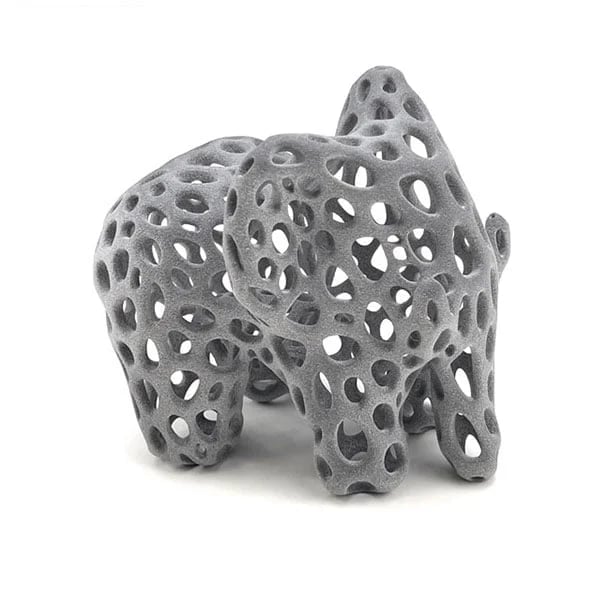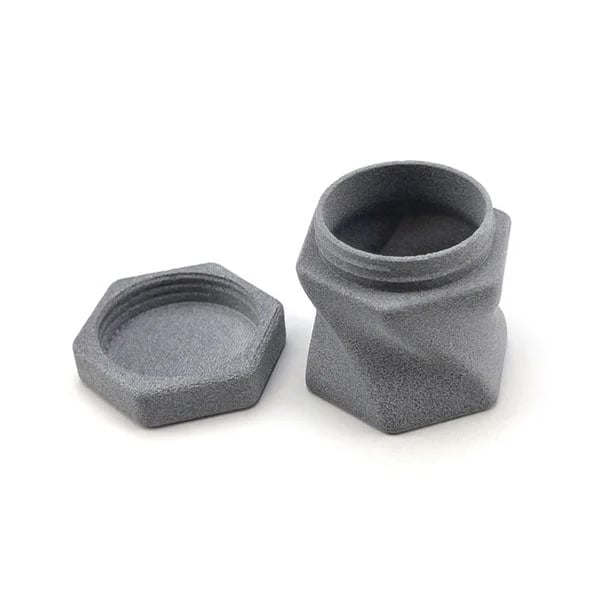Nylon PA12 glass beads
The Nylon PA12 GB is added 40% with glass beads to improve stiffness and resistance to wear and heat resistance. Perfect for automotive, industrial, and consumer applications, these glass beads are the perfect choice for your needs.

PROS
- It is the material with the highest thermal resistance for HP MJF
- Rigid and resistant structure
- Good wear resistance
CONS
- Fragile behaviour for thin thicknesses
- Difficult to print in large formats
- Parts with large flat surfaces can deform
MAIN FEATURES
- 3D printing process: MJF
- Tolerance: <100mm ± 0,40mm; >100mm± 0,4%
- Max size: 380x284x380mm; 15x11.2x15in
- Lead time: <5 days
- Available finishes: dyeing, vapor smoothing, semi-matt, semi-gloss and metallic painting
PA12 GLASS BEADS 3D PRINTING GALLERY
NYLON PA12 GB COMMENT
Nylon PA12 GB, enriched with 40% glass beads, represents a significant innovation in the field of composite materials. This material has been specifically designed to improve stiffness and offer superior resistance to wear and heat, making it particularly suitable for a wide range of applications in the automotive, industrial and consumer sectors. The presence of the glass beads not only increases the material's mechanical strength but also helps improve its thermal properties, making it an ideal choice for environments and applications requiring materials that can withstand extreme conditions.
The unique composition of glass-filled nylon sets it apart in the landscape of composite materials, offering an optimal solution for those seeking a material that combines durability and high performance. This combination of properties makes it essential in the creation of parts and components that not only need to resist wear and tear and high temperatures, but also require a solid and reliable structure.
Pros
Best Thermal Performance: Glass-filled PA12 is distinguished by its outstanding thermal performance. Its ability to withstand high temperatures makes it an ideal material for applications in demanding environments, where heat resistance is a key requirement. This characteristic is particularly valuable in sectors such as automotive and industrial, where materials often have to withstand the heat generated by machinery or engines.
Rigidity: The addition of glass beads to Nylon PA12 not only increases its strength but also significantly improves its rigidity. This is crucial for components that must maintain their shape and structural integrity under load or stress. Nylon PA12 GB's improved rigidity makes it suitable for a variety of structural applications where material stability is a priority.
Improved Wear Resistance: Wear resistance is another key advantage of Nylon PA12 GB. This material is able to withstand prolonged mechanical wear, making it ideal for parts that are subjected to regular mechanical stress. This property is particularly useful in industrial applications where component durability and longevity are essential.
Cons
Fragility in Thin Layers: One of the drawbacks of Nylon PA12 GB is its tendency to be fragile when it comes to thin layers. This characteristic necessitates particular attention during the design and 3D printing phases. Designers must carefully consider the wall thickness and the overall geometry of the parts to prevent fragility and ensure the strength of the finished piece. This aspect is especially important in applications where components are subjected to significant stress or loads, as fragility in thin layers can compromise the structural integrity of the component.
Deformation on Large Surfaces: Another disadvantage of Nylon PA12 GB is its propensity to deform on large surfaces. This phenomenon can occur during the 3D printing process or subsequently, under the influence of thermal or mechanical stress. Deformation can negatively impact the dimensional accuracy and aesthetic appearance of the components, necessitating special considerations in design and production. It is important to evaluate the material distribution and the orientation of the parts during printing to minimise the risk of deformation. Additionally, post-processing techniques or the use of support structures may be necessary to maintain the desired shape of the component during and after printing.
Applications of Nylon 12 GB
Seals in Mechanical, Electrical, and Electronic Products: Nylon PA12 GB is frequently used to create efficient and durable seals in these sectors. Its ability to withstand mechanical and thermal stress makes it ideal for sealing components in environments where protection against moisture, dust, and other contaminants is essential.
Functional Parts with Hinge Operations: Thanks to its low coefficient of friction, glass-loaded PA12 is perfect for producing parts that require smooth and uniform sliding movements, such as hinges and sliding guides in machinery and equipment.
Durability and Longevity: This material is particularly reliable for creating parts that require a long lifespan. Its wear resistance and dimensional stability make it suitable for components that need to maintain their mechanical properties over time, even under intense usage conditions.
Dimensional Stability: Glass-filled Nylon provides excellent dimensional stability, making it ideal for applications that require precise fitting and operation, such as precision machinery parts and components of electronic devices.
Chemical Resistance: It offers robust protection against environmental and chemical damages, making it suitable for use in industrial environments where materials may be exposed to corrosive substances or solvents.
Food and Beverage Industry: Complying with the highest hygiene standards, PA12 GB is an ideal choice for applications in the food and beverage industry, where safety and cleanliness are of utmost importance.
Outdoor Applications: Its resistance to damage caused by UV light and high temperatures makes it perfect for challenging outdoor applications, such as components for external construction or equipment exposed to the elements.
Thermal and Electrical Insulation: The Nylon PA12 GB is perfectly suited to a wide range of applications in the construction and design sectors, thanks to its thermal and electrical insulation properties.
Large Industrial Applications: The robustness of glass-filled Nylon PA12 makes it suitable for large-scale industrial applications, ensuring many years of reliable service. This includes components for heavy machinery, manufacturing equipment, and other applications where strength and durability are crucial.
Conclusion
In conclusion, Nylon PA12 GB stands out as an exceptionally versatile and robust solution, suitable for a wide variety of applications across different sectors. Its unique combination of enhanced rigidity, exceptional wear resistance, and thermal stability makes it an ideal material for environments and applications that demand high-quality, durable, and reliable materials. These characteristics make it particularly well-suited for sectors such as automotive, electronics, industrial, and even food, where strength and durability are essential.
Despite some limitations, such as fragility in thin layers and potential deformation in the presence of large surfaces, PA12 GB continues to be an excellent choice for a broad range of applications. These disadvantages can be mitigated with careful design and advanced production techniques, allowing designers and engineers to fully leverage its unique properties.
Its ability to withstand challenging environmental conditions, coupled with compliance to hygiene standards for use in the food and beverage industry, makes it an extremely adaptable and practical material. Furthermore, its resistance to chemical attacks and dimensional stability make it ideal for applications that require precision and long-term reliability.
Ultimately, glass-filled PA12 represents a significant advancement in the field of composite materials, offering new opportunities and solutions for a variety of industrial and design challenges. With its combination of advanced mechanical properties and versatility, Nylon PA12 GB positions itself as a preferred choice for future innovations across a wide range of industrial and consumer sectors.
MATERIAL PROPERTIES
| Tensile breaking load | 31 MPa |
| Modulus of elasticity | 2900 MPa |
| Elongation at break | 7% |
| Flexural modulus | 2400 MPa |
| HDT 0.45 MPa | 171 ºC |
| Izod impact resistance | 3,6 kJ/m² |
I use Weerg's nylon PA12GB parts for many of my engineering projects because they are so adaptable and dependable, and I have no doubt that they will continue to exceed my expectations.
Questions and answers on NYLON PA12 Glass Beads
Nylon PA12 is a versatile and general-purpose polymer that offers a good balance between cost and performance. It is characterized by strength, durability, low water absorption, and good dimensional stability. Thanks to its lower cost, it is ideal for prototypes and functional applications that are not overly demanding but less suitable for specialized uses compared to other variants.
Nylon PA12GB is a reinforced version of PA12, with 40% glass beads added. This makes the material stiffer and more resistant to wear and heat, characteristics that make it perfect for industrial and automotive applications requiring high mechanical performance. However, this increased rigidity can make it more brittle in thin components or very large surfaces.
Nylon PA11, on the other hand, is a biopolymer derived from renewable resources, such as castor oil. Compared to PA12, it offers greater flexibility, resilience, and impact resistance. It is ideal for applications that need to withstand high loads or wear over time. Additionally, PA11 has a reduced environmental impact due to its natural origin.
PA12GB, with its 40% glass bead content, is widely used in industrial and automotive sectors where rigidity, wear resistance, and thermal stability are essential. In the automotive industry, it is applied in the production of components subject to high stress, such as housings, structural supports, and engine parts. In the industrial sector, it is used to manufacture gears, bearings, and other functional parts that require durability even under extreme working conditions. Consumer goods also benefit, especially products requiring mechanical strength and dimensional precision, such as tools and electronic devices. Its property combination makes PA12GB an ideal choice for demanding and specific applications.
The addition of glass beads modifies both the aesthetic and functional properties of PA12GB. Aesthetically, the material takes on a matte finish and a rougher texture compared to standard PA12, which might make it less suitable for applications requiring smooth and refined surfaces. Regarding workability, the increased stiffness provided by the reinforcement improves dimensional stability and reduces warping but can increase brittleness in thin sections or parts with complex geometries. Moreover, components with very large surfaces might be prone to deformation, requiring careful design and proper configuration of printing parameters to ensure optimal results. These aspects must be carefully considered during the design phase to maximize the material's benefits without compromising final quality.
QUOTE IN 3 SECONDS WITHOUT COMMITMENT
Do you want to turn your 3D project into reality?
Upload your 3D file to get one step closer to manufacturing your parts.
free instant quote

